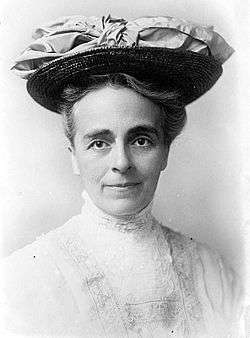Catherine Waugh McCulloch

Catherine Gouger Waugh McCulloch (June 4, 1862 – April 20, 1945, age 82) was an American lawyer and noted suffragist.
She was a pioneer for American women in the legal profession. She was active in campaigning for women's suffrage and legislation granting equal rights to women. She also served as legal advisor (1904–1911) and vice-president (1910–1911) of the National American Woman Suffrage Association. Additionally, she was an active member of the National Association of Women Lawyers.
Life
Raised in Illinois, Catherine Waugh graduated from Rockford College, and later would serve on its board of trustees ("Mrs. M'Culloch," 13). She came to Chicago to study law, and received her degree from what is today Northwestern University in 1886.[1] In November of that year, she became the 18th woman admitted to the bar in Illinois.
While studying for her law degree, she began dating a fellow student, Frank McCulloch. He was not in favor of her having a career, but he ultimately changed his mind. They married on 30 May 1890, and became partners in the law firm of McCulloch and McCulloch ("Pioneer Woman", N5). In 1929 they jointly authored and published A Manual of the Law of Will Contests in Illinois.
Catherine Waugh McCulloch drafted and successfully lobbied for the passage of a law in 1901 that gave women equal guardianship with their husbands over their children, and in 1905 to raise the age of consent for girls from 14 to 16 years. In 1907 she was elected Justice of the Peace in Evanston, Illinois (and re-elected in 1909), making her the first woman elected to that office in Illinois. While a Justice of the Peace, she made national headlines by agreeing to conduct egalitarian marriage ceremonies in which she omitted the word "obey" from the ritualized words the woman was supposed to say; at that time, the man pledged to "love, honor and cherish" while the woman pledged to "love, honor and obey." ("She Will Omit," 1)
In 1917 she was appointed as a master in chancery of the Cook County Superior Court. She became known for her advocacy in working to eliminate or modify marriage and divorce laws that discriminated against women, and she worked to create uniformity of such laws in all states ("Women's League," 3)
With Esther Dunshee Bower she fought for the Illinois Women's Jury Bill, finally signed into law in 1939. She was the legal adviser for the National American Woman Suffrage Association (which became the League of Women Voters in 1920 after passage of the 19th Amendment) and was its first vice president. She also served as the legal adviser for the National Women's Christian Temperance Union ("Drys of Illinois," 2)
The McCullochs had four children: Hugh Waugh, Hathorn Waugh, Catharine Waugh, and Frank Waugh. All of her sons became attorneys, and her daughter was married to one ("Pioneer Woman," N5). Catherine W. McCulloch Park in Evanston is named for her.
Publications
- Bittenbender, Ada M. "Women in Law," in Farmer, Lydia Hoyt. The national exposition souvenir: what America owes to women Buffalo: C.W. Moulton, 1893. Pages 390–408.
- Drysdale, William. "The Woman Lawyer," in Helps for ambitious girls New York: T.Y. Crowell & Co., c1900. Pages 180–208.
- "Law," in Training for the professions and allied occupations: facilities available to women in the United States. New York: Bureau of Vocational Information, 1924. Pages 427–450.
- McCulloch, Catharine Waugh. "Women as Law Clerks" manuscript. c1887. (12 pages).
- Bureau of Vocational Information (New York, N.Y.). Records, 1908–1932: A Finding Aid
- Mr. Lex, Or The Legal Status of Mother and Child. Chicago: Fleming H. Revell Company, 1899, 85 pp.
References
Works Cited
"Drys of Illinois Urge Safeguards About Beer Sales." Christian Science Monitor, 20 April 1933, p. 2.
"Mrs. M'Culloch, 82, Legal Figure, Dies." New York Times, 21 April 1945, p. 13.
"She Will Omit 'Obey'." Washington Post, 6 April 1907, p. 1.
"Pioneer Woman Lawyer, Mate in Golden Jubilee." Chicago Tribune, 2 June 1940, p. N5.
"Women's League Heads Plan Work of Future." Baltimore Sun, 15 November 1920, p. 3.
External links
- Harvard University Library Open Collections Program. Women Working, 1870–1930, Catharine Gouger Waugh McCulloch (1862-1945). A full-text searchable online database with complete access to publications written by Catharine McCulloch.
- Women's Legal History Biography Project, Robert Crown Library, Stanford Law School. McCulloch, Catharine Gouger Waugh. Biographical articles, collected papers and archival materials.
- Papers, 1877-1983. Schlesinger Library, Radcliffe Institute, Harvard University.